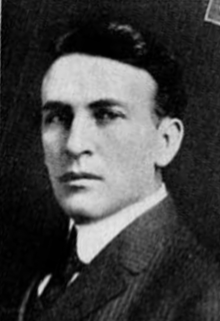| William McKinley | |
|---|---|
 | |
| 44th Speaker of the Illinois House of Representatives | |
| In office January 29, 1913 – January 6, 1915 | |
| Preceded by | Charles Adkins |
| Succeeded by | David Shanahan |
| Personal details | |
| Born | William Michael McKinley (1879-06-01)June 1, 1879 Postville, Iowa |
| Died | August 12, 1965(1965-08-12) (aged 86) Glenview, Illinois |
| Political party | Democratic |
| Spouse | Katherine Elizabeth Riley |
| Alma mater | Iowa State Normal School (BA) Chicago-Kent College of Law (LL.B.) |
William Michael McKinley (June 1, 1879 – August 12, 1964) was an American lawyer and politician who served as a Democratic member of the Illinois House of Representatives. He was the Speaker of the Illinois House from January 29, 1913, to January 8, 1915.
Early life
Born in Postville, Iowa, McKinley went to the University of Northern Iowa. After completing those studies, he was a school principal in Ashton, Iowa, and Castalia, Iowa. He moved to Chicago to study law at Chicago-Kent College of Law. He received his LL.B. in 1907. He managed the congressional campaign of Richard J. Finnegan. He practiced law in Chicago and was a law partner of Barratt O'Hara, who would go on to be elected Lieutenant Governor of Illinois the same year that McKinley was elected to the House, at McKinley & O'Hara. He became engaged to Katherine Elizabeth Riley with whom he was engaged prior to his time in the legislature. They eventually married and remained such until her death in 1962.
Legislative career
In the 1912 election, he was elected to the Illinois House of Representatives as one of three representatives from the 21st district alongside Harry L. Shaver and Franklin S. Catlan. That election cycle, the Democratic Party held a plurality of 71 members in the chamber with the Republicans at 52 members, the Progressives at 27, and the Socialists at 3 members. Each ran its own candidate. McKinley was proposed by Roger Charles Sullivan as a compromise candidate among several Democratic factions. He was elected Speaker and took the post on January 29, 1913. He was elected by a combination of Democrats, Republicans, and Progressive.
As speaker, McKinley played a key role in the passage of the law granting Illinois women municipal and presidential suffrage, which was enacted on June 26, 1913. After being lobbied by both proponents and opponents of the cause, McKinley moved the bill to a legislative vote, the first time such a bill had gone to vote in the state legislature. According to the Rockford Republican, "McKinley’s fiancée had refused to formalize their engagement until the suffrage bill passed." The act made Illinois the first state east of the Mississippi River to give women the right to vote for President.
Post-legislative career
In 1914, McKinley ran for judge. After his single term in office, he maintained his law practice and was a financial supporter of Blackburn College. McKinley died August 12, 1964, in Glenview, Illinois, where he had resided for the two prior years.
Notes
- ^ Illinois Blue Book 1913-1914. p. 300. Retrieved September 12, 2022.
- ^ Redmond, Mary (1980). Mr. Speaker: Presiding Officers of the Illinois House of Representatives 1818-1980. Office of the Speaker of the House. pp. 39–40. Retrieved September 8, 2022.
- ^ "RISE IN CAREER OF NEW SPEAKER: William McKinley, Now 32 Started Life in Iowa as School Teacher". Chicago Tribune. January 30, 1913. p. 2 – via ProQuest.
- ^ "McKinley, 85, Dies; Lawyer, Legislator". ProQuest. August 13, 1964. p. n20.
- Morton, Richard. Roger C. Sullivan and the Triumph of the Chicago Democratic Machine, 1908–1920. McFarland & Company. p. 105.
- "New Speaker of the Illinois House". Rock Island Argus. Vol. 62, no. 88. January 30, 1913. Retrieved September 12, 2022.
- McConnaughy, Corrine M. (2013-10-14). The Woman Suffrage Movement in America: A Reassessment. Cambridge University Press. p. 152. ISBN 9781107433960.
- "Flashback Springfield: Women get (limited) right to vote". The State Journal-Register. Retrieved 2019-08-03.
- Trout, Grace Wilbur (1920). "Side Lights on Illinois Suffrage History". Journal of the Illinois State Historical Society. 13 (2): 152. ISSN 0019-2287. JSTOR 40194491.
- News of the Day Concerning Chicago The day book. (Chicago, Ill.), 25 June 1914. Chronicling America: Historic American Newspapers. Lib. of Congress.
- Wixon, Richard (1997). "Biographical Sketch of William McMinkey". In Weatherly Sharp, Nancy; Sharp, James Roger (eds.). American Legislative Leaders in the Midwest, 1911-1994. Westport, Connecticut: Greenwood Press. p. 171. ISBN 9780313302145. Retrieved September 12, 2022.
- 1879 births
- 1964 deaths
- Politicians from Chicago
- People from Postville, Iowa
- University of Northern Iowa alumni
- Chicago-Kent College of Law alumni
- Educators from Iowa
- Illinois lawyers
- Speakers of the Illinois House of Representatives
- Democratic Party members of the Illinois House of Representatives
- Educators from Illinois
- 20th-century members of the Illinois General Assembly
